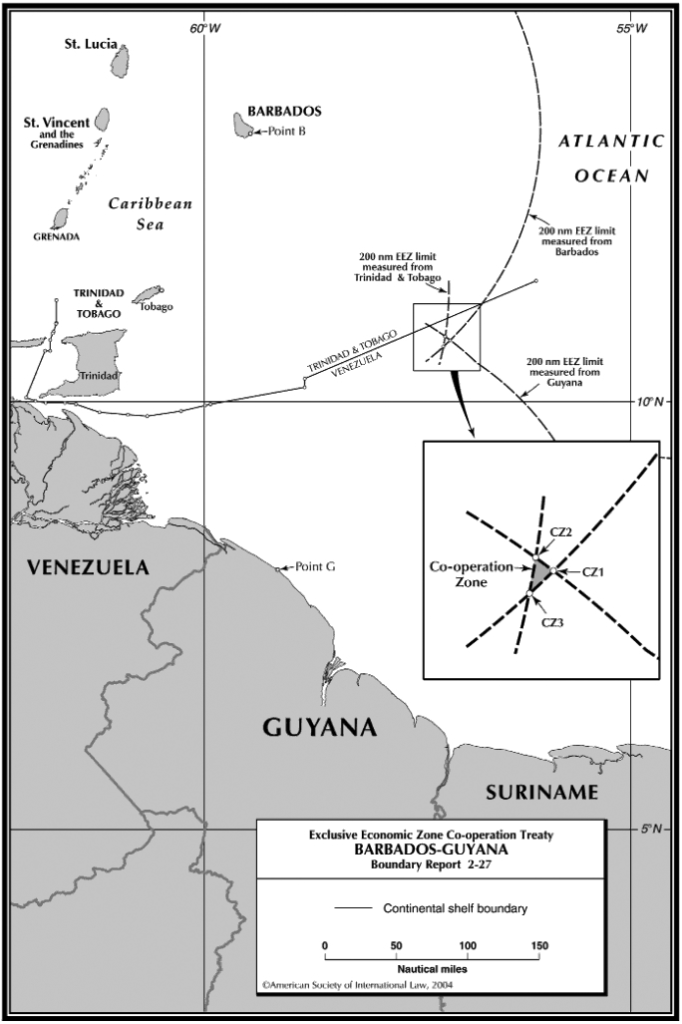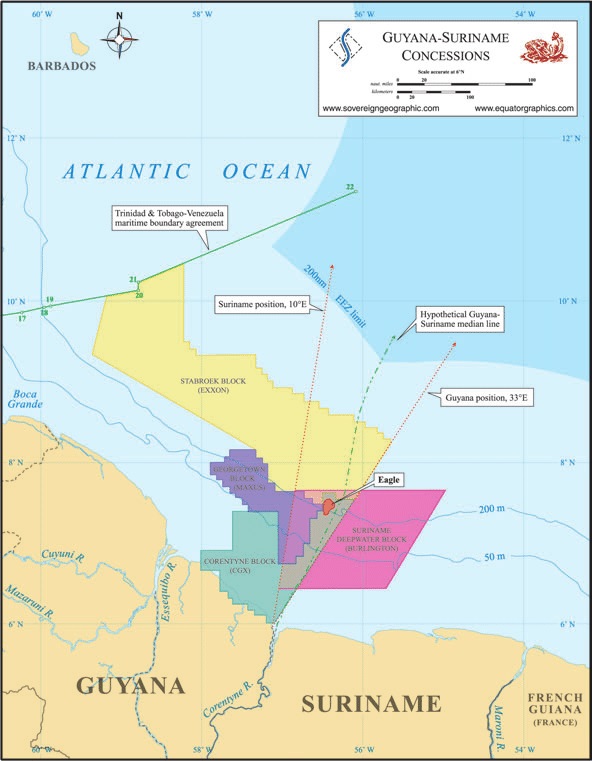Barbados and Guyana assert overlapping EEZ claims and continental shelf entitlements in an OCA located opposite the North East coast of continental South America. As discussed in the following paragraphs, the jurisdictional entitlements of Barbados and Guyana in this area are contested by Venezuela. Design features of provisional joint management frameworks:
In December 2003 both States concluded a treaty establishing a detailed framework for the cooperative management of this area (2003 Treaty). The 2003 Treaty is expressly characterized as an implementation of the LOSC, and LOSC provisions concerning provisional management of overlapping EEZ claims. The preambular text of the 2003 Treaty recognizes ‘the relevance and applicability’ of LOSC Article 74(3) in addition to emphasizing the ‘universal and unified character’ of the LOSC ‘and its fundamental importance for the maintenance and strengthening of international peace and security, as well as for the sustainable development of the oceans and seas’.
Article 1(1) of the 2003 Treaty establishes a ‘Co-operation Zone’ for the ‘exercise of joint jurisdiction, control, management, development, and exploration and exploitation of living and non-living natural resources, as well as all other rights and duties’ established in the LOSC. The remaining paragraphs of Article 1 contain language designed to protect the legal positions of both States concerning delimitation of the OCA and the extent of their respective coastal State jurisdiction. They provide as follows:
- This Treaty and the Co-operation Zone established thereunder are without prejudice to the eventual delimitation of the Parties’ respective maritime zones in accordance with generally accepted principles of international law and the Convention.
- The Parties agree that nothing contained in the Treaty nor any act done by either Party under the provisions of the Treaty will represent a derogation from or diminution or renunciation of the rights of either Party within the Co-operation Zone or throughout the full breadth of their respective exclusive economic zones.
The Co-operation Zone consists of defined triangular area that is declared to be co-extensive with the area of bilateral overlap between the EEZ claims of both States. The Zone is located (1) on the Venezuelan side of a comprehensive maritime boundary established by Venezuela and Trinidad & Tobago and (2) beyond 200 nautical miles from the undisputed portions of the coastlines of those States. The Zone is however defined by reference to a point located within 200 nautical miles of Guyana-administered territory west of the Essequibo River, which is also claimed by Venezuela. Venezuela has actively protested the maritime claims of Barbados and Guyana in the vicinity of the ‘Co-operation Zone’, and both Barbados and Guyana have expressed concern that the Trinidad & Tobago – Venezuela delimitation agreement infringes upon their claims to an EEZ and extended continental shelf. Accordingly, the 2003 Treaty may be viewed as a diplomatic response by both Parties to maritime claims promulgated by their regional neighbours. Nonetheless, the Treaty does make some effort to accommodate the positions of other States, both through the preambular acknowledgment LOSC delimitation provisions and through Article 4 which provides that:
The Parties shall have due regard to the rights and duties of other States in the Co-operation Zone in accordance with generally accepted principles of international law and the [Law of the Sea] Convention, and in particular the provisions of Article 58 of the Convention [concerning rights and duties of other States in the EEZ].
The 2003 Treaty contains detailed provisions concerning management of the Cooperation Zone and the exercise of national jurisdiction within it. Article 5 addresses jurisdiction over living natural resources, providing for the exercise by both States of ‘joint jurisdiction’ in accordance with a ‘Joint Fisheries Licensing Agreement’, coordinated national measures and relevant international law. Negotiations to establish the Joint Fisheries Licensing Agreement are required to commence within three months of the Treaty’s entry into force. In the event of a failure to reach agreement concerning ‘the exercise of their joint jurisdiction over living resources’ in the Co-operation Zone, neither State is entitled exercise jurisdiction on a unilateral basis.
Article 6 of the 2003 Treaty addresses jurisdiction over non-living natural resources, providing for the exercise by both States of ‘joint jurisdiction’ in accordance with relevant international law. The exercise of jurisdiction over non-living natural resources is to be managed by a ‘Joint Non-Living Resources Commission’ established ‘at such time as agreed’ by both States. In the absence of an agreement concerning ‘the exercise of their joint jurisdiction over non-living resources’ in the Co-operation Zone, neither State is entitled to exercise jurisdiction on a unilateral basis.
Article 6 of the 2003 Treaty also contains provisions concerning the cooperative conduct of marine scientific research; information exchange; unitization of non-living natural resources that straddle the boundary of the Co-operation Zone; and the sharing of non-living natural resources located within the zone.
Article 7 of the 2003 Treaty obliges both States to reach agreement concerning the cooperative exercise within the Co-operation Zone of jurisdiction over ‘Security Matters’. Negotiations to establish a security agreement are required to commence within three months of the Treaty’s entry into force. The following entitlement applies prior to the entry into force of the security agreement:
… unless otherwise provided for in this Treaty, each Party shall unilaterally exercise defense and criminal jurisdiction within and in relation to the Co-operation Zone to the same extent that it may do so within and in relation to that part of its exclusive economic zone that lies outside the Co-operation Zone.
The 2003 Treaty also establishes cooperative frameworks concerning protection of the marine environment in the Co-operation Zone and ongoing consultation between both States. Article 10 provides for recourse to the dispute settlement framework (including compulsory and binding procedures) set out in the LOSC in the event that direct diplomatic negotiations have failed to resolve a dispute concerning the interpretation or application of the 2003 Treaty.
Comment concerning functional coverage:
The 2003 Treaty contains provisions allocating coastal State competence and/or jurisdiction within the relevant OCA in a complete set of functional contexts – it specifies the terms on which Barbados and Guyana are to implement within the relevant OCA all of the functional components of their coastal State jurisdiction. However, 2003 Treaty does not provide for the exercise of jurisdiction by other States (namely Venezuela) asserting claims to the Co-operation Zone. Because Venezuela is not party to the 2003 Treaty and is not bound by the Treaty’s obligations, ambiguities of the international legal framework concerning the exercise of coastal State jurisdiction within OCAs continue to impact upon relations between all claimant coastal States and management of the relevant OCA.


